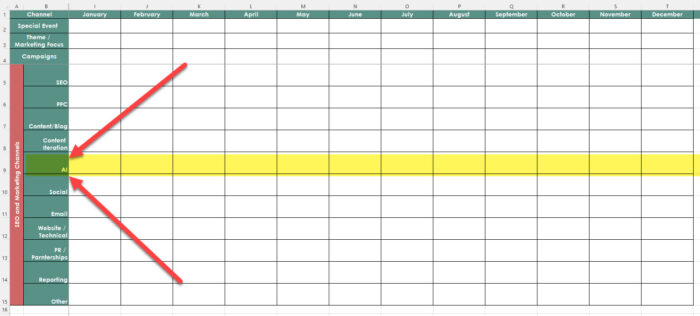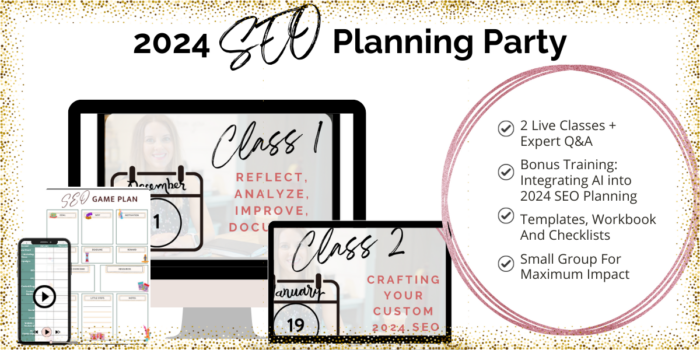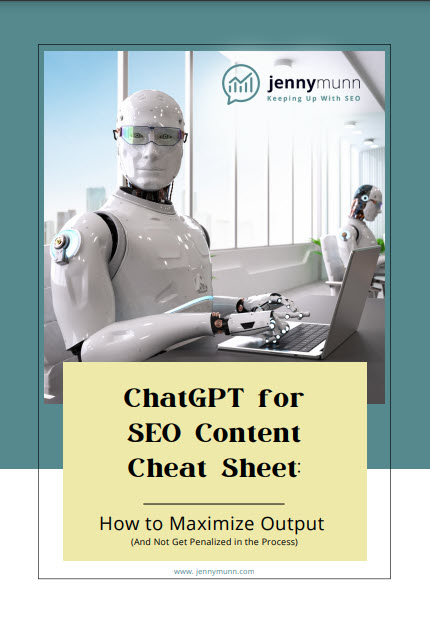If you only have 1 hour a week to “do” your SEO, are you 100% confident you’re using that hour in the MOST impactful way?
When you have a plan, you can confidently answer yes.
The challenge is, sitting down to craft your SEO strategy for world domination the year can be daunting to say the least.

So I decided to put together a few SEO planning tips to jumpstart your efforts. Let’s get right to it. The 4 tips are:
- Tip #1: Create a CYA Clause
- Tip #2: “Fly by the Seat of Your Pants SEO” Is for Amateurs
- Tip #3: How to Integrate AI Into Your 2024 SEO Plan
- Tip #4: Stop making your SEO plan so big you can’t finish it
SEO PLANNING TIP #1: Create a CYA Clause
What is a CYA Clause? CYA stands for “Cover Your A$$.”
There’s undoubtedly a nicer term for this, but let’s be honest. It’s much more fun to say CYA.
A CYA clause is an acknowledgment that there is a limitation. At its core, it’s about risk mitigation and preparedness. Shifting priorities, internal business indecisiveness, and unexpected challenges can all impact your strategy’s effectiveness. Everyone is going to face obstacles – pretending they don’t exist doesn’t do anyone any favors, so let’s lay them out.
CYA Fundamentals and Important Rules:
- The first rule of a CYA clause: You should never, and I repeat NEVER, explicitly label this section in any document a “CYA Clause;” you’ll want this heading to be more professional or PC such as “Obstacles to Success” or “Expected Challenges”
- A CYA should be educational – you can’t expect your client, boss, or team to know why these areas could be a detriment to SEO
- A CYA clause helps manage expectations; it’s important to be clear about what you can and cannot achieve with SEO, and be transparent
- A CYA clause helps identify boundaries and parameters you have to work within; this clarity makes you better at your job.
- What a CYA is NOT
It is crucial to understand what a CYA clause is not meant to be:
- A cop-out or a series of excuses about why you didn’t get results. A CYA must be used professionally, and effectively, and you should ideally be a trusted partner, vendor, or employee.
- A negative spiral or hidden way to voice your complaints about your conditions, coworkers, having to come into the office, etc. In the context of SEO, a CYA clause is a singular section and should not be pages and pages long.
- A blanket statement attributing all potential SEO challenges to uncontrollable factors like Google’s algorithm updates or competitors’ actions. Instead, a CYA clause should be tailored to the specific resources, goals, and performance metrics relevant to the client or company in question.
While CYA is used cheekily, it actually does represent a very important part of the plan. And again, a great plan is communicated to all the stakeholders early and often.
3 CYA Clause Examples
Here are examples I’ve included before:
- Technical weaknesses like site speed and page load time that I suspect may negatively impact our ability to rank high for specific pages
- CMS restrictions that don’t allow us to fully apply on-page optimizations
- Lack of access to SMEs (subject matter experts) to get content that Google wants to rank due to E-E-A-T algorithm changes
SEO PLANNING TIP #2: “Fly by the Seat of Your Pants SEO” Is for Amateurs
I have one tactical, and one strategic tip for you when it comes to avoiding “fly by the seat of your pants SEO.” It’s simple but effective.
- Tactical: Verb, Date, Person, Time Length. From a tactical perspective, here’s how I want you to think of every SEO action item:
A verb, a date, a person, a time length:
- A verb: what is the action that needs to be done?
- A date: when should this action be initiated, and when should it be wrapped up?
- A person: who is going to do this, and are they aware of this expectation?
- A time length: how long is this going to take?
The perfect tool for this is one like Trello, Asana, or Basecamp. Most people think an SEO task is a one-time nice and tidy SEO to-do. WRONG. Most SEO tasks are actually projects. (Want to go deeper into this topic? Check out this resource: Want to Succeed With SEO? Make Your Work Visible!
- Strategic: Define Your SEO Goal, and Work Backwards. There’s a reason why every single SEO training I do begins with defining an SEO goal. Because it dictates everything! SEO IS TOO BIG OF AN ANIMAL TO TACKLE AT ONCE.
From a strategic perspective, you must have a clearly defined SEO goal/priority. Because that informs what you should be doing from a tactical perspective.
Once you have crafted a statement around your SEO goal, that is what you measure and report on every month. Honestly, it makes your life SEO much simpler when you have a focused SEO plan versus a “spray-and-pray-fly-by-the-seat-of-your-pants” SEO NON-plan.
SEO PLANNING TIP #3: How to Integrate AI Into Your 2024 SEO Plan
There’s a common theme surrounding AI SEO recommendations I’ve seen over the last year. In some ways, it’s frustrating that the most common advice around preparing for AI integration with SEO is a rehash of what has been said for years now. But here’s the difference – we’re beating the drum louder about what needs to be done with a greater sense of urgency.
My AI tip is to finally make decisions and cross some of these foundationally newer SEO tasks off your list so we can move on to the areas that are truly new.
Foundational AI tasks that aren’t quite so new but are critical:
- Establish topical expertise
- Implement Schema markup
- Adjust for a people-first approach
- Build a trustworthy, reliable brand
- Create content that reflects experience, expertise, authoritativeness, and trustworthiness
New AI best practices:
- Create “follow-up” content to align with conversational AI tools
- Adopt semantic SEO search techniques by creating pillar-page/hub and spoke content clusters
- Employ entity SEO techniques to understand and develop content around “strings and things”
- Ensure your brand is correlated with and cited in reputable, third-party sources
- Understand where your target market is using Search outside of Google/Bing
So here’s my 2024 SEO Planning AI tip: account for the unknown. Make “AI” a recurring task in your SEO implementation cadence so that you plan to integrate new best practices and roll with updates and changes without getting caught off guard.
Because here’s what we don’t know yet:
- Will ChatGPT, Bard, and Claude steal market share from people who turn to Google for information and questions?
- Once generative AI gets baked into Google, will website traffic and clicks take a nosedive?
- Will universal adoption of The New Bing experience (ChatGPT being baked into Bing’s search engine) entice people to move to Microsoft Edge?
- How definitively do we get our brand and content into the AI-generated summary?
For me, here is what that “looks” like (see my screenshot below): making AI a dedicated initiative until it becomes part of my regular cadence, and I can fold it into my “SEO” dedicated channel. Proactively planning to keep up with inevitable changes and implement new best practices will not throw my plan off because these have been factored into my plan.

We have to account for the unknown while also continuing to follow timeless SEO best practices, such as carrying across your SEO strategy off-site, keyword research and on-page optimization, internal linking and deploying a hub and spoke content, mapping keywords to content based on match and user intent, and crafting relevant content through a deep understanding of the customer AND the customer experience.
SEO PLANNING TIP #4: Stop Making Your SEO Plan So Big You Can’t Finish It
Now on to my final tip – the biggest challenge I see time and time again when it comes to SEO planning.
YOU’RE MAKING YOUR SEO PLAN TOO BIG!
Like you, the marketers and business owners I know are stretched thin with many competing priorities.
You don’t have time to do everything you want. This means if and when you can actually sit down to create an SEO plan, it has to be something you can knock out and NOT drag on and on forever. Your SEO plan should not include everything under the sun. You need closure.
What I often see, is that there is so much to do that contributes to SEO, so much on your wishlist, it makes it hard to get out of planning mode and into action mode.
So let’s exit planning mode.
Deep breath.
Now. You have two options.
- Check out my 1-Hour Guide to Writing a Year-End SEO Report and DIY the crap out of your plan. You’ve got this.
- Check out the details of my upcoming 2024 SEO Planning Party Workshop and let’s get your plan knocked out together.
Jenny Munn
Latest posts by Jenny Munn (see all)
- Four 2024 SEO Planning Tips for World Domination - November 16, 2023
- SEO Planning Tip: Why You Need a CYA Clause - November 3, 2023
- How Long Does SEO Take to Show Results? (Updated for 2023) - August 9, 2023



